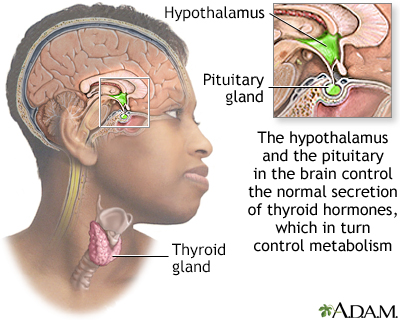Hypothalamus
The hypothalamus is an area of the brain that produces hormones that regulate:
- Body temperature
- Heart rate
- Hunger
- Mood
- Release of hormones from many glands, especially the pituitary gland
- Sex drive
- Sleep
- Thirst

The hypothalamus is a highly complex structure in the brain that regulates many important brain chemicals. Malfunction of this area of the brain may affect basic functions like sleep, appetite, and temperature.

Although the thyroid gland releases the hormones which govern growth and metabolism, the brain (the pituitary and the hypothalamus) manages the release and the balance of the amount of hormones circulated.
Information
HYPOTHALAMIC DISEASE
Hypothalamic dysfunction can occur as a result of diseases, including:
- Genetic causes (often present at birth or during childhood)
- Infection or inflammation
- Injury as a result of trauma, surgery or radiation
SYMPTOMS OF HYPOTHALAMIC DISEASE
Because the hypothalamus regulates so many different functions, hypothalamic disease can have many different symptoms, depending on the cause. The most common symptoms are:
- Increased appetite and rapid weight gain
- Extreme thirst and frequent urination (diabetes insipidus)
- Low body temperature
- Slow heart rate
References
Christian HC. Anatomy and physiology of the hypothalamus and pituitary. In: Robertson RP, ed. DeGroot's Endocrinology. 8th ed. Philadelphia, PA: Elsevier; 2023:chap 13.
Hafida S, Apovian CM. Obesity and neuroendocrine control of energy stores. In: Melmed S, Auchus RJ, Goldfine AB, Rosen CJ, Kopp PA, eds. Williams Textbook of Endocrinology. 15th ed. Philadelphia, PA: Elsevier; 2025:chap 40.
Weiss RE. Neuroendocrinology and the neuroendocrine system. In: Goldman L, Cooney KA, eds. Goldman-Cecil Medicine. 27th ed. Philadelphia, PA: Elsevier; 2024:chap 204.
Version Info
Last reviewed on: 4/24/2025
Reviewed by: Sandeep K. Dhaliwal, MD, board-certified in Diabetes, Endocrinology, and Metabolism, Springfield, VA. Also reviewed by David C. Dugdale, MD, Medical Director, Brenda Conaway, Editorial Director, and the A.D.A.M. Editorial team.
